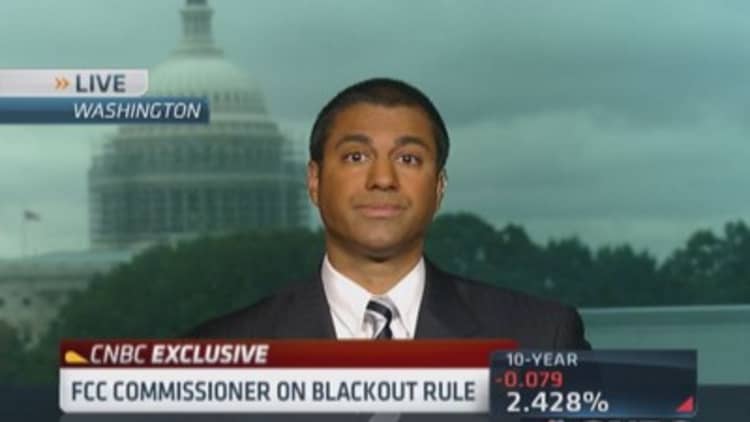
FCC commissioner Ajit Pai told CNBC he doesn't expect the NFL to rush to pay TV now that game blackouts are banned.
The Federal Communications Commission unanimously decided on Tuesday to end the NFL's 40-year-old policy that allowed the league to black out TV broadcasts of home games based on ticket sales.
"It's a long time coming," commissioner Ajit Pai said Wednesday of the FCC vote. "I think members of the public and ultimately the FCC came to the realization that this 40-year-old rule wasn't serving public interest."
This decision, however, could prompt the NFL to move toward the pay-TV approach. Pai feels this approach may not be successful in the long run.
Read More FCC votes unanimously to repeal sports TV blackout rule
"I don't think [pay TV] would be a good idea," Pai said on "Squawk on the Street." "The NFL has long-term contracts with the TV broadcasters that extend until 2022. If they did move to paid TV, they would essentially be eliminating the reach of what is a pretty unique product. I would argue that the fact that the NFL is on over the air broadcasting is what's allowed it to dominate the sports market today."
Pai said that it was in the best interest of the FCC to cater to the needs of the fans.
"For any number of reasons—the cost of the game, disability, family obligations—a lot of people who are avid NFL fans just can't make it to the games," Pai said. "I think the FCC should be vindicating their interest and seeing their teams on the air as opposed keeping them in the dark."
Read More Tax-exempt? The NFL's nonprofit status by the numbers
The FCC ruling still may not stop the NFL from blacking out the games. Ultimately, it will be up to the leagues and teams negotiating with broadcasters and cable and satellite companies to distribute the product. However, Pai hopes that "everyone will realize that a more fan-friendly approach ultimately is good not just for the fans, but for the teams themselves in terms of revenues long term."
CORRECTION: An earlier version had an incorrect day for the FCC ruling.

